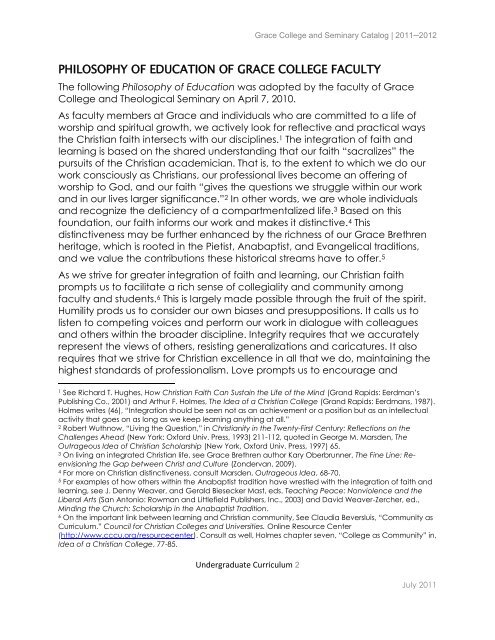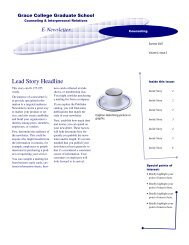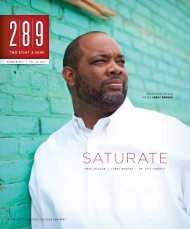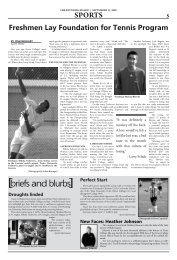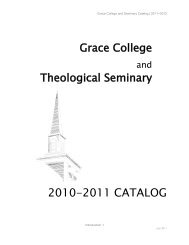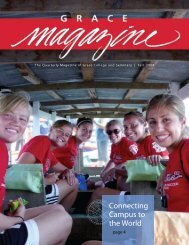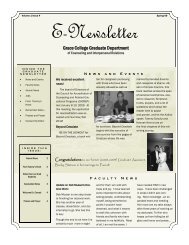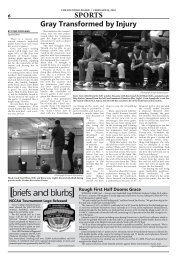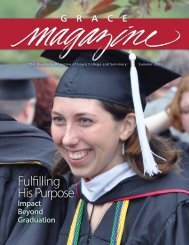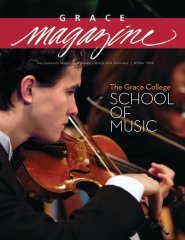Undergraduate Curriculum - Grace College and Seminary
Undergraduate Curriculum - Grace College and Seminary
Undergraduate Curriculum - Grace College and Seminary
You also want an ePaper? Increase the reach of your titles
YUMPU automatically turns print PDFs into web optimized ePapers that Google loves.
<strong>Undergraduate</strong> <strong>Curriculum</strong> 2<br />
<strong>Grace</strong> <strong>College</strong> <strong>and</strong> <strong>Seminary</strong> Catalog | 2011–2012<br />
PHILOSOPHY OF EDUCATION OF GRACE COLLEGE FACULTY<br />
The following Philosophy of Education was adopted by the faculty of <strong>Grace</strong><br />
<strong>College</strong> <strong>and</strong> Theological <strong>Seminary</strong> on April 7, 2010.<br />
As faculty members at <strong>Grace</strong> <strong>and</strong> individuals who are committed to a life of<br />
worship <strong>and</strong> spiritual growth, we actively look for reflective <strong>and</strong> practical ways<br />
the Christian faith intersects with our disciplines. 1 The integration of faith <strong>and</strong><br />
learning is based on the shared underst<strong>and</strong>ing that our faith “sacralizes” the<br />
pursuits of the Christian academician. That is, to the extent to which we do our<br />
work consciously as Christians, our professional lives become an offering of<br />
worship to God, <strong>and</strong> our faith “gives the questions we struggle within our work<br />
<strong>and</strong> in our lives larger significance.” 2 In other words, we are whole individuals<br />
<strong>and</strong> recognize the deficiency of a compartmentalized life. 3 Based on this<br />
foundation, our faith informs our work <strong>and</strong> makes it distinctive. 4 This<br />
distinctiveness may be further enhanced by the richness of our <strong>Grace</strong> Brethren<br />
heritage, which is rooted in the Pietist, Anabaptist, <strong>and</strong> Evangelical traditions,<br />
<strong>and</strong> we value the contributions these historical streams have to offer. 5<br />
As we strive for greater integration of faith <strong>and</strong> learning, our Christian faith<br />
prompts us to facilitate a rich sense of collegiality <strong>and</strong> community among<br />
faculty <strong>and</strong> students. 6 This is largely made possible through the fruit of the spirit.<br />
Humility prods us to consider our own biases <strong>and</strong> presuppositions. It calls us to<br />
listen to competing voices <strong>and</strong> perform our work in dialogue with colleagues<br />
<strong>and</strong> others within the broader discipline. Integrity requires that we accurately<br />
represent the views of others, resisting generalizations <strong>and</strong> caricatures. It also<br />
requires that we strive for Christian excellence in all that we do, maintaining the<br />
highest st<strong>and</strong>ards of professionalism. Love prompts us to encourage <strong>and</strong><br />
1 See Richard T. Hughes, How Christian Faith Can Sustain the Life of the Mind (Gr<strong>and</strong> Rapids: Eerdman’s<br />
Publishing Co., 2001) <strong>and</strong> Arthur F. Holmes, The Idea of a Christian <strong>College</strong> (Gr<strong>and</strong> Rapids: Eerdmans, 1987).<br />
Holmes writes (46), “Integration should be seen not as an achievement or a position but as an intellectual<br />
activity that goes on as long as we keep learning anything at all.”<br />
2 Robert Wuthnow, “Living the Question,” in Christianity in the Twenty-First Century: Reflections on the<br />
Challenges Ahead (New York: Oxford Univ. Press, 1993) 211-112, quoted in George M. Marsden, The<br />
Outrageous Idea of Christian Scholarship (New York, Oxford Univ. Press, 1997) 65.<br />
3 On living an integrated Christian life, see <strong>Grace</strong> Brethren author Kary Oberbrunner, The Fine Line: Reenvisioning<br />
the Gap between Christ <strong>and</strong> Culture (Zondervan, 2009).<br />
4 For more on Christian distinctiveness, consult Marsden, Outrageous Idea, 68-70.<br />
5 For examples of how others within the Anabaptist tradition have wrestled with the integration of faith <strong>and</strong><br />
learning, see J. Denny Weaver, <strong>and</strong> Gerald Biesecker Mast, eds. Teaching Peace: Nonviolence <strong>and</strong> the<br />
Liberal Arts (San Antonio: Rowman <strong>and</strong> Littlefield Publishers, Inc., 2003) <strong>and</strong> David Weaver-Zercher, ed.,<br />
Minding the Church: Scholarship in the Anabaptist Tradition.<br />
6 On the important link between learning <strong>and</strong> Christian community, See Claudia Beversluis, “Community as<br />
<strong>Curriculum</strong>.” Council for Christian <strong>College</strong>s <strong>and</strong> Universities. Online Resource Center<br />
(http://www.cccu.org/resourcecenter). Consult as well, Holmes chapter seven, “<strong>College</strong> as Community” in,<br />
Idea of a Christian <strong>College</strong>, 77-85.<br />
July 2011


